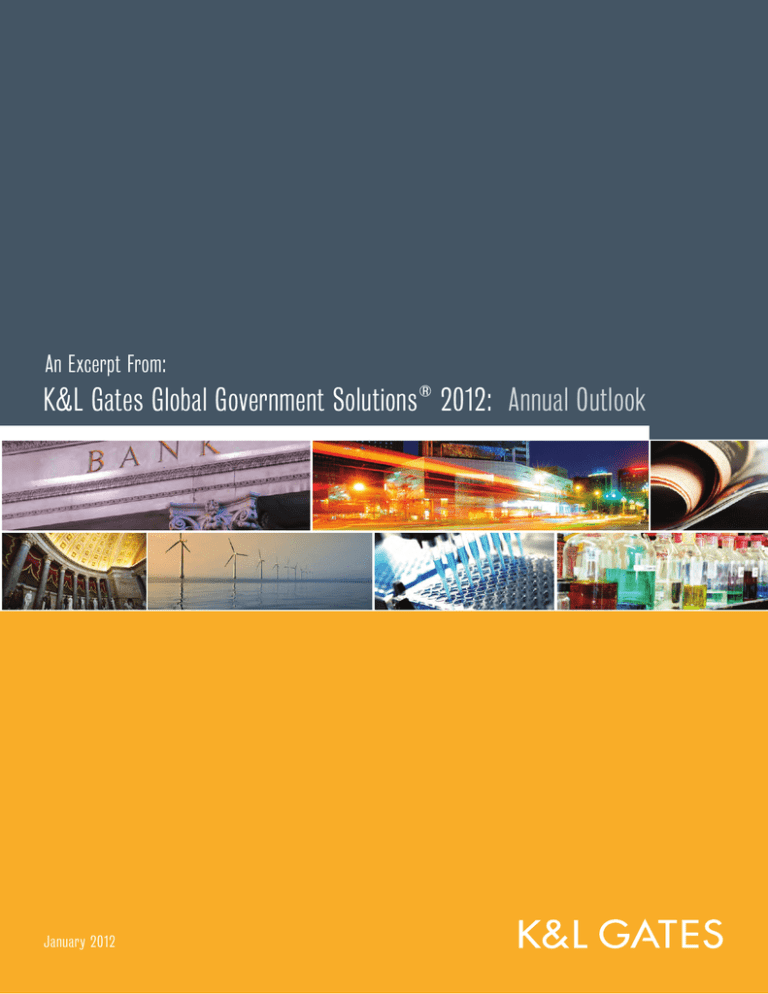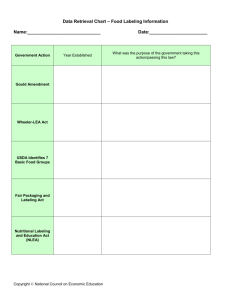
An Excerpt From:
K&L Gates Global Government Solutions ® 2012: Annual Outlook
January 2012
Healthcare, Food, and Life Sciences
New EU Food Labeling Law Requires Clarity of Consumer Information
The EU’s new Food Information Regulation (FIR) came into effect on December
12, 2011. The FIR sets out labeling requirements for nutritional and country of
origin information on foods intended for retail consumers. The FIR represents
a considerable change from prior requirements for food labeling. It combines
and updates Directive 2000/13, on labeling, presentation, and advertising of
foodstuffs, and Directive 90/496, on nutrition labeling for foodstuffs, and adding
new requirements on food labeling.
For most of the new provisions, there is a
three-year transitional period for importers
and producers to comply, and a five-year
period for the application of mandatory
nutrition declaration requirements.
Food Information
Among other things, the FIR introduces
mandatory nutrition labeling for most
processed foods, including information
on the energy value, amounts of fat,
saturates, carbohydrates, protein, sugars,
and salt. Information must be presented
in a single, clearly legible table on the
packaging, and expressed as amounts
per 100ml or 100g. Provisionally
exempted from this requirement are
alcoholic beverages containing more
than 1.2 percent by volume of alcohol,
and unprocessed foods contained in
packaging too small to accommodate
mandatory labeling requirements (less
than 25cc). A product, irrespective of its
size, must also display information about
its name, whether certain allergens are
contained in the product, its net quantity,
and the date by which it must be
consumed. Regarding the exemption for
alcoholic beverages, the commission must
revisit the new regulation within three
years and address whether mandatory
nutrition information should apply for
alcoholic beverages in the future.
Producers of pre-packaged food will have
to adjust contents and layout of labels
to the additional information required. If
pre-packaged food is sold by internet or
76
mail order, sellers will also have to make
available all mandatory information in
advance of the sale, e.g., on the related
webpage or catalog entry.
Requirements for country of origin
labeling have been extended. Previously,
origin marking was obligatory only for
certain foods such as beef, honey, and
olive oil. The FIR now requires country of
origin labeling for most meats, including
fresh meat from pigs, sheep, poultry,
and goats, as well as additional food
categories, e.g., dairy products. The
commission is obliged to develop specific
rules for mandatory labeling of meat
within two years, and is even authorized
to extend the country of origin labeling
further on other types of meat, milk,
single-ingredient products and ingredients
that represent more than 50 percent of
a food.
The FIR strengthens previous provisions on
the identification of potentially allergenic
substances, requiring that this information
be provided not only on prepackaged
foods, but with regard to all foods. EU
member states are authorized to decide
the means by which this information
should be provided to consumers. Food
providers selling non-prepackaged foods,
in particular supermarkets, caterers, and
restaurants, will need to adapt and train
employees in order to ensure compliance
with the new requirements.
K&L Gates Global Government Solutions ® 2012 Annual Outlook
Fair Information Practices
Complementary to the general
prohibition of misleading commercial
practices set out in Directive 2005/29
(Unfair Commercial Practices Directive),
the FIR generally requires food labeling
not to be misleading. This requirement
also applies to advertising and the
presentation of foods, including the
appearance or packaging, the way in
which food products shall be arranged,
and the setting in which they shall be
displayed. Therefore, any pictorial
presentations and marketing claims
on packaging or advertisements must
comply with fair information practices.
These practices become particularly
important in connection with so-called
“imitation foods,” which look like natural
foods, but substitute different components
or ingredients for the natural ingredient.
A prominent example is “cheese” made
from vegetable oils.
Liability of Food Operators
The FIR contains specific provisions as
to responsibility along the food chain
regarding the presence and accuracy of
food information. Legal responsibility for the
food information lies with the food business
operator, i.e., the operator under whose
name the food is marketed. As the FIR
requires the food operator to be listed on
the packaging, importers and retailers will
have to make sure that the original supplier
of a food product is named on the product
in order to avoid liability for the accuracy
of the presented food information.
Dr. Mathias Schulze Steinen, LL.M. (Frankfurt)
mathias.schulze-steinen@klgates.com
Daniela Bohn (Frankfurt)
daniela.bohn@klgates.com
Anchorage Austin Beijing Berlin Boston Brussels Charleston Charlotte Chicago Dallas Doha Dubai Fort Worth Frankfurt Harrisburg
Hong Kong London Los Angeles Miami Moscow Newark New York Orange County Palo Alto Paris Pittsburgh Portland Raleigh
Research Triangle Park San Diego San Francisco São Paulo Seattle Shanghai Singapore Spokane Taipei Tokyo Warsaw Washington, D.C.
K&L Gates includes lawyers practicing out of 40 offices located in North America, Europe, Asia, South America,
and the Middle East, and represents numerous GLOBAL 500, FORTUNE 100, and FTSE 100 corporations, in
addition to growth and middle market companies, entrepreneurs, capital market participants and public sector
entities. For more information about K&L Gates or its locations and registrations, visit www.klgates.com.
This publication is for informational purposes and does not contain or convey legal advice. The information herein should not be used or relied upon in regard to
any particular facts or circumstances without first consulting a lawyer.
©2012 K&L Gates LLP. All Rights Reserved.

